| Srl | Item |
| 1 |
ID:
083799
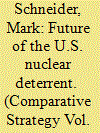

|
|
|
|
|
| Publication |
2008.
|
| Summary/Abstract |
The United States must maintain an effective nuclear deterrent because, without it, the U.S. could be destroyed as an industrial civilization, and our conventional forces could be defeated by a state with grossly inferior conventional capability but powerful weapons of mass destruction (WMD). Both Russia and China have the nuclear potential to destroy the U.S. (and our allies) and are modernizing their forces with the objective of targeting the U.S. missile defenses and conventional strike capabilities, while critically important elements of deterrence and national power simply cannot substitute for nuclear deterrence. In light of the emerging "strategic partnership" between Russia and China and their emphasis on nuclear weapons, it would be foolish indeed to size U.S. strategic nuclear forces as if the only threat we face is that of rogue states and discard the requirement that the U.S. nuclear deterrent be "second to none."
|
|
|
|
|
|
|
|
|
|
|
|
|
|
|
|
| 2 |
ID:
133990
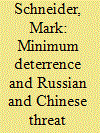

|
|
|
|
|
| Publication |
2014.
|
| Summary/Abstract |
Minimum Deterrence advocates, such as the Global ZERO report chaired by retired General James Cartwright, often urge the elimination of the U.S. triad of ICBMs, SLBMs, and bombers and minimum modernization of U.S. nuclear forces. These recommendations ignore fundamental realities. Both Russia and China have announced that they intend to increase their nuclear forces and both are modernizing their forces. Russia and China regard the U.S. as their main enemy and are arming against us. The Minimum Deterrence assumption that there is no risk of a conflict between the U.S. and Russia or China is a dangerous one. Both Russia and China have significant territorial claims against their neighbors. Russian claims to the Arctic Ocean and Chinese claims over the South China Sea are particularly troubling. China continues to threaten war over Taiwan. China has increasingly used military might to support its territorial claims in the South China Sea, creating incidents that have the potential to escalate into war. The most fundamental problem with Minimum Deterrence is that it intentionally degrades our deterrence of nuclear or other WMD attack, as well as our ability to deter nuclear escalation in a situation where the U.S. provides allies a credible nuclear umbrella. U.S. failure to provide a credible nuclear umbrella could result in Japan and, possibly other nations, deciding to go nuclear in order to protect themselves.
|
|
|
|
|
|
|
|
|
|
|
|
|
|
|
|
| 3 |
ID:
132000
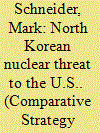

|
|
|
|
|
| Publication |
2014.
|
| Summary/Abstract |
A recent unclassified Defense Intelligence Agency (DIA) assessment stated: "DIA assesses with moderate confidence the North [Korea] currently has nuclear weapons capable of delivery by ballistic missiles." This conclusion is highly credible and not really new. North Korea was assessed to have nuclear weapons long before the actual (or at least detected) first test of these weapons in 2006. Building a nuclear weapon small enough to be carried by the relatively large payloads of North Korea's ballistic missiles is not a very difficult task today. In light of what is now known about the proliferation of a nuclear missile warhead from China to Pakistan and from Pakistan to North Korea, the North Korea defector reports about nuclear weapons development and the North Korean nuclear tests, the DIA conclusion may be an understatement. The North Korean nuclear stockpile may be significantly greater than what is usually assessed. This is of concern because the North Korean regime is the most brutal Stalinist dictatorship in the world. Moreover, while North Korea has long made occasional nuclear attack threats against the U.S. in the past, the scope, magnitude, and frequency of these threats vastly increased in 2013. Current U.S. policy, which downgrades the importance of nuclear deterrence and cuts missile defense, is not well suited to handle this threat.
|
|
|
|
|
|
|
|
|
|
|
|
|
|
|
|
| 4 |
ID:
104089
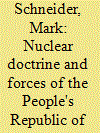

|
|
|
|
|
| Publication |
2009.
|
| Summary/Abstract |
The People's Republic of China is the only member of the P-5 that is increasing both the quantity and quality of its nuclear forces. This nuclear buildup is in the context of military buildup that growing faster than any nation in the world. The China buildup is aimed a providing it a capability to dominate the Far East. The U.S. is regarded as main enemy and Chinese preparations are aimed at fight a major war against the United States.
|
|
|
|
|
|
|
|
|
|
|
|
|
|
|
|
| 5 |
ID:
084090
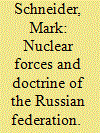

|
|
|
|
|
| Publication |
2008.
|
| Summary/Abstract |
Nuclear weapons and strategic strike capability are the highest priority of the Russian Federation. Russia is deploying both advanced new strategic nuclear delivery vehicles and new types of nuclear weapons. Russian military leaders have openly stated that Russia has deliberately lowered the nuclear use threshold and talk about the use of nuclear weapons in regional and local wars. This is attributed to weakness in conventional forces. However, a number of respected Russian military analysts argue that the real motive is to increase political clout against the United States and NATO. Russia has formally adopted a nuclear escalation doctrine in which the introduction of nuclear weapons into a conventional conflict is characterized as "deescalation" of the conflict. Unlike NATO's "flexible response" doctrine of the 1960s-the nearest parallel to current Russian thinking-there is a dangerous assumption that the use of few nuclear weapons will end a conflict with a Russian victory. Failure to view Russia realistically could endanger U.S. national security in the future.
|
|
|
|
|
|
|
|
|
|
|
|
|
|
|
|